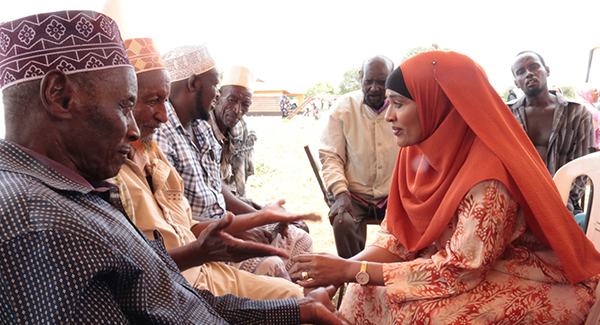A Bold New Chapter in the Fight for Equality
In the windswept plains of Isiolo County, where the sun scorches the earth and tradition runs deep in the veins of the Borana people, a new kind of revolution is quietly gaining momentum — one that may finally tip the scales in the fight against gender-based violence (GBV). It is not driven by loud protests or court battles, but by something far more powerful: honest conversations and courageous hearts.
At the forefront of this transformative movement is Hon. Rehema Jaldesa, Chairperson of the National Gender and Equality Commission (NGEC). In the past two weeks, she has led the Commission on a high-stakes mission in Isiolo — one that didn’t just aim to raise awareness, but to reshape mindsets and reclaim justice at the very core of community life.And she came home to do it.
“It brings me great joy and pride to be with you today, here at home in Isiolo County, where I was born and raised,” she told a packed forum of elders, women, youth, and faith leaders. “This forum is not just a meeting.
It is a message — that NGEC has heard your voices, and we are here to walk with you.”
The campaign, themed Eliminating GBV and Enhancing Access to Justice, marked a significant shift in tone and strategy. Focused on denormalizing domestic violence, dismantling harmful cultural practices, and empowering local structures, the NGEC team chose Isiolo deliberately. This is a county where patriarchal values remain entrenched — where silence has often triumphed over justice, and where suffering has been quietly woven into the fabric of daily life. But in Isiolo, that silence is now being broken — not by outsiders, but from within. And men are leading the charge.
Hon. Jaldesa’s tactic was disarmingly simple, yet profoundly effective:Speak to men not as culprits, but as allies. She didn’t lecture; she invited. She didn’t condemn; she challenged. She addressed the Borana elders with respect and truth, framing the fight against GBV not as a battle against culture, but a battle for dignity, safety, and a future worth believing in.
“Men of Isiolo,” she said, “you are the pillars of our families and the guardians of our traditions. We need you to say no to early marriages. No to female circumcision. To protect, not harm. To lead, not silence.”
The message landed. One elder stood up and said, “If our Chairperson has come all the way from Nairobi to speak to us like this, not with commands but with care, then we too must do our part.” In that moment, a cultural shift — subtle but seismic — took place.
The campaign also included structured stakeholder dialogues, mobile legal clinics, youth forums, and collaborative forums with religious leaders and chiefs. These weren’t just activities — they were a blueprint for sustainable, community-driven change. Survivors of GBV, for the first time in many cases, felt seen and heard. Young girls and boys were educated on their rights. And men — especially the youth — were invited into leadership roles as GBV champions.
This wasn’t a token engagement. It was a full-circle return. By grounding the Commission’s message in her identity as a daughter of Isiolo, Hon. Jaldesa breathed new life into what has long felt like a losing battle. “Change does not come from Nairobi,” she told the gathering. “It starts here. It starts with one man who says, ‘I will not allow violence in my home.’ One elder who says, ‘Our culture will not be used to harm.’ One youth who says, ‘I want to be part of the solution.’”
NGEC’s approach has always emphasized partnership, data, and dignity. But in Isiolo, it found a new gear: emotional resonance.
The stories shared were raw, the wounds still fresh, but for the first time, healing seemed possible — because the healing began in the presence of those who had long held the power to prevent the hurt.
Hon. Jaldesa’s words struck a generational chord:
“To my fellow women and girls, your voice matters. Your life matters. Do not be afraid to speak up. You are not alone. This Commission is here to stand with you.”
The Isiolo campaign may be one of many NGEC has conducted across the country, but it will be remembered as a turning point. Not just for its scale, but for its soul.
As the Borana proverb goes, “Quibh tok, injiran hin ijesu” — One finger cannot kill lice. It takes all of us. And in Isiolo, for the first time in a long time, all of us are showing up.
This is not just a campaign. It’s the beginning of a cultural awakening.
And it began where it always had to — at home.
NGEC Chairperson Hon. Rehema Jaldesa holds a spirited dialogue with Borana elders in Kinna, Isiolo County, rallying traditional leadership in the grassroots campaign to end gender-based violence.


Comments